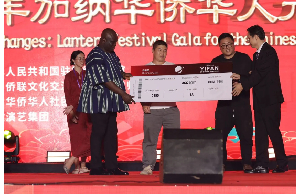Our attention has been drawn to an article published on Ghanaweb On Friday, 15th June, 2012, titled “NHIS Is Dying! – Mensah", referencing a TV3 mid-day news item in which Mr. Sylvester Mensah, Chief Executive of the National Health Insurance Authority (NHIA) shed light on various aspects of the scheme’s operations.
In the interview, Mr. Mensah clarified issues about the National Health Insurance Scheme (NHIS) such as the proposed 1-Time Premium and Capitation, an additional provider payment system currently being implemented on a pilot basis in the Ashanti region of Ghana.
We would like to set the records straight on this twisted and distorted version of the news item that appeared on Ghanaweb and authored by one Yaw P.K Manu.
CAPTION: The Chief Executive DID NOT say that the “NHIS is dying”. Indeed the scheme is healthier today than it was before. It accounts for more than 80% of internally generated funds in public health facilities. Utilization continues to grow. Many new reforms are driving efficiency and productivity in the NHIS. Notable amongst these are the introduction of a Claims Processing Centre which has contributed significantly to ensure that payment of claims to service providers are faster than they used to be, and the introduction of Clinical Audit to eliminate abuse and improve quality of care, not forgetting the mass registration exercises that are expanding health insurance coverage of the poor and vulnerable.
On the global stage, Ghana’s Health Insurance Scheme continues to attract international attention and recognition as an emerging model of healthcare financing for other countries. Study tours by visiting delegations affirm the rising profile of Ghana’s NHIS. It would be recalled that in November 2010, Ghana’s NHIS proudly won the UN award for excellence and is fast becoming a hub of shared learning and shared experience in the developing world and beyond.
PARAGRAPH 2: The Chief Executive DID NOT mention that the current annual expenditure of the scheme is about 19 million Ghana Cedis. What the Chief Executive said, and which was clear in the TV3 mid-day news was that utilization is not less than 19 million. Utilization represents medical encounters or visits by patients. Utilization is measured by number of visits, not money. It is therefore unfortunate that the stated utilization figure has been monetized and wrongly presented by the writer as annual expenditure. Again, the Chief Executive DID NOT say that plans are far advanced to significantly increase NHIS premium rates from January 2013.
PARAGRAPH 3: Contrary to Yaw Manu’s false claims, medicines are still in the NHIS benefit package and have not been withdrawn. The NHIS continues to provide free maternal care services. Antenatal, deliveries (including caesarean section) and postnatal services are all covered.
When capitation was being introduced in the Ashanti Region, service providers in the region suggested that the scheme pays for free maternal care through an existing payment mechanism called G-DRG, instead of capitation. The NHIS agreed to do so. They also argued that if they have to use the capitated amount to cover medicines it will not be enough. Therefore, as a concession, the NHIS agreed to pay for medicines separately through the existing itemised billing, different from the capitation money that providers are paid in advance. Medicines continue to be prescribed and dispensed as before and paid for by the NHIA/NHIS.
Apart from these gestures, the NHIA also increased the money paid in advance to healthcare providers under capitation. This also means yet more money in the kitty for providers to take care of NHIS patients under capitation. The statement attributed to the CEO, that Free Maternal Care and Medicines have been withdrawn from the scheme is absolutely false. In fact, the NHIS medicine’s list has been reviewed to include other new and efficacious medicines, and the amounts paid to service providers for medicines were increased last year.
These positives contrast the misrepresentation by the author of the statements made by the Chief Executive of the NHIA.
A social health insurance scheme such as Ghana’s own has technical aspects, and it is important for commentators to seek clarification on matters they may not understand before throwing out falsehood to the public. It would be prudent not to politicize the NHIS and undermine public confidence in a national institution that Ghanaians cherish and support; a healthcare safety net for the poor and vulnerable acclaimed globally for its worth and rising profile as a model for other countries.
Issued by Strategy & Corporate Affairs Division National Health Insurance Authority Accra, Ghana**
Health News of Monday, 18 June 2012
Source: NHIA
RE: NHIS Is Dying! – MENSAH
Entertainment











